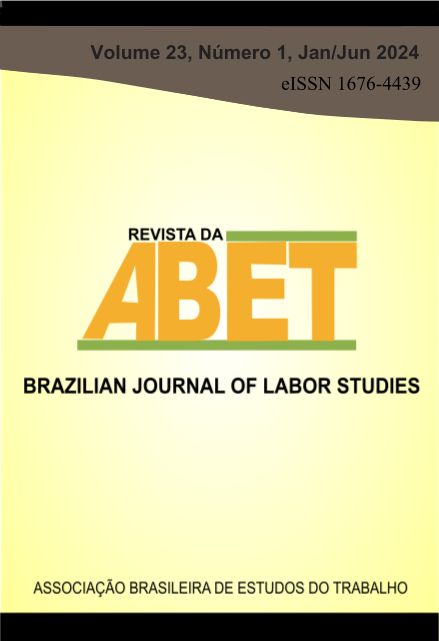Collective Action Amidst Relational Poverty:
Dynamics and Potentials of Digital Spaces of Organization in the World of Precarious Work
DOI:
https://doi.org/10.61999/abet.1676-4439.2024v23n1.67701Abstract
Categories such as outsourced cleaning, surveillance, and cafeteria workers are characterized by a high degree of fragmentation into small job positions, on the one hand, and high employee turnover, on the other — elements that have often been identified as obstacles to the consolidation of strong "associative power" for these categories. How does the diffusion of new communication technologies impact the prospects for collective action and organization among these workers? Through an examination of nine distinct cases of small-scale collective action, studied through in-depth interviews with their protagonists, we have identified that the "closed" architecture of WhatsApp has made this platform central in driving these mobilizations. The primary consequence of using this platform has been the consolidation and combination of the "weak ties" networks among these workers, enabling connections between physically and functionally isolated job positions. We will also discuss the significant variability in how workers form these digital groups in times of crisis and conflict (based on the networks and institutional actors involved at each workplace), as well as the transformations in the ways these digital groups have been utilized following the conclusion of these mobilizations.
Downloads
Metrics
Downloads
Published
How to Cite
Issue
Section
License
Copyright (c) 2024 Alexandre Guelerman

This work is licensed under a Creative Commons Attribution-NonCommercial-NoDerivatives 4.0 International License.
Política de Acesso Livre
Esta revista oferece acesso livre imediato ao seu conteúdo, seguindo o princípio de que disponibilizar gratuitamente o conhecimento científico ao público proporciona maior democratização mundial do conhecimento.
Atribuição dos artigos é não comercial (sem derivações 4.0, isto é, Creative Commons) e o acesso é livre e gratuito para download e leitura.
Não há taxa para submissão, avaliação e publicação de artigos.
Copyright
1) Os artigos são de responsabilidade exclusiva dos autores. É permitida sua reprodução, total ou parcial desde que seja citada a fonte.
2) Os trabalhos enviados para publicação devem ser inéditos, não sendo permitida sua apresentação simultânea em outro periódico nacional.
3) Os artigos são submetidos a pareceristas "ad hoc", após prévia avaliação da Comissão Editorial, os quais podem aceitar, recusar ou reapresentar o original ao autor com sugestões para alterações. Os nomes dos pareceristas permanecem em sigilo, bem como os nomes dos autores.
Os Autores que publicam nesta revista concordam com os seguintes termos:
Autores mantêm os direitos autorais e concedem à revista o direito de primeira publicação, com o trabalho simultaneamente licenciado sob a Creative Commons Attribution License, permitindo o compartilhamento do trabalho com reconhecimento da autoria do trabalho e publicação inicial nesta revista.
Autores têm autorização para assumir contratos adicionais separadamente, para distribuição não-exclusiva da versão do trabalho publicada nesta revista (ex.: publicar em repositório institucional ou como capítulo de livro), com reconhecimento de autoria e publicação inicial nesta revista.
Autores têm permissão e são estimulados a publicar e distribuir seu trabalho online (ex.: em repositórios institucionais ou na sua página pessoal), já que isso pode gerar alterações produtivas, bem como aumentar o impacto e a citação do trabalho publicado.
Patrocinador
A publicação recebe financiamento da Associação Brasileira de Estudos do Trabalho.










